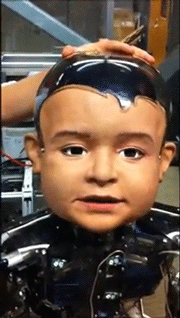In “The Dawn of Artificial Intelligence,” the Economist considers the insinuation of Weak AI in our lives, for better and worse, and the longer-range concerns about Strong AI. The (un-bylined) writer compares conscious machines, if they’re ever realized, to bureaucracies, military and markets, though I don’t know that the sometimes uncontrollable nature of those things is a perfect analogue. An excerpt:
The first step is to understand what computers can now do and what they are likely to be able to do in the future. Thanks to the rise in processing power and the growing abundance of digitally available data, AI is enjoying a boom in its capabilities (seearticle). Today’s “deep learning” systems, by mimicking the layers of neurons in a human brain and crunching vast amounts of data, can teach themselves to perform some tasks, from pattern recognition to translation, almost as well as humans can. As a result, things that once called for a mind—from interpreting pictures to playing the video game “Frogger”—are now within the scope of computer programs. DeepFace, an algorithm unveiled by Facebook in 2014, can recognise individual human faces in images 97% of the time.
Crucially, this capacity is narrow and specific. Today’s AI produces the semblance of intelligence through brute number-crunching force, without any great interest in approximating how minds equip humans with autonomy, interests and desires. Computers do not yet have anything approaching the wide, fluid ability to infer, judge and decide that is associated with intelligence in the conventional human sense.
Yet AI is already powerful enough to make a dramatic difference to human life. It can already enhance human endeavour by complementing what people can do. Think of chess, which computers now play better than any person. The best players in the world are not machines however, but what Garry Kasparov, a grandmaster, calls “centaurs”: amalgamated teams of humans and algorithms. Such collectives will become the norm in all sorts of pursuits: supported by AI, doctors will have a vastly augmented ability to spot cancers in medical images; speech-recognition algorithms running on smartphones will bring the internet to many millions of illiterate people in developing countries; digital assistants will suggest promising hypotheses for academic research; image-classification algorithms will allow wearable computers to layer useful information onto people’s views of the real world.
Even in the short run, not all the consequences will be positive.•

